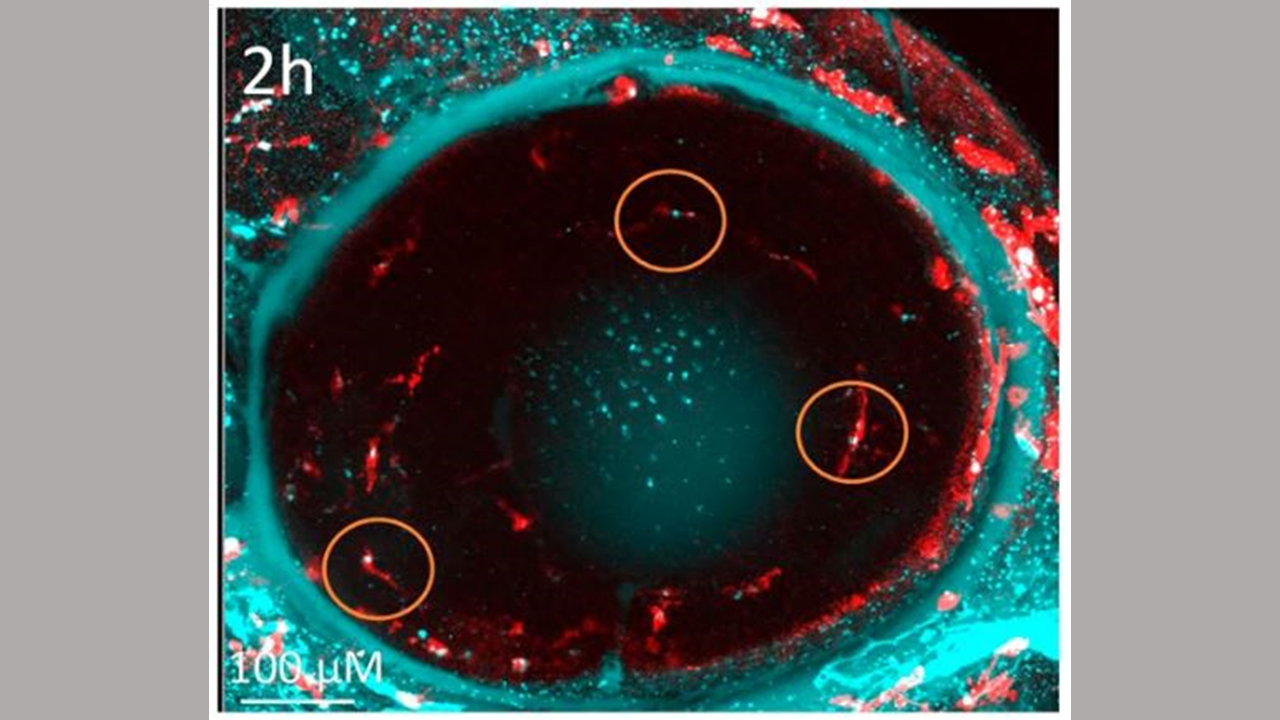
Image of zebrafish larvae retina. The orange circles highlight nanoparticles loaded with dexamethasone interacting with immune cells in the eye. Credit: Jeffrey Mumm
In a recent study from the Wilmer Eye Institute, researchers say they found that using a nanoparticle to target immune cells in the eyes of zebrafish enhanced neuron regeneration rates after injury. This research expands on previous studies, from Wilmer and other institutions, which showed that immune cells (microglia) regulate retinal cell regeneration in zebrafish and mice models.
In this latest paper, published May 18 in Communications Biology, researchers report that using a nanoparticle to target and deliver an immunosuppressant drug to active microglia in degenerating zebrafish retinas is an effective method of dosing and stimulating regeneration of lost retinal cells.
"Here we found bringing an immunosuppressive medicine directly to microglia cells enhances these effects, speeding up the regenerative process even more dramatically - about twice as fast as the drug alone," says Jeffrey Mumm, Ph.D., corresponding author and the Helen Larson and Charles Glenn Grover Professor in Ophthalmology and associate professor of ophthalmology.
Researchers first attached an immunosuppressant drug, dexamethasone, to the nanoparticle dendrimer, previously developed at Wilmer with the help of Kannan Rangaramanujam, Ph.D., M.S. In the experiment, the nanoparticle delivered the drug payload to active immune cells in zebrafish retinas and suppressed the cells' activity. Researchers confirmed that this suppression contributed to improvement of neuron regeneration rates through an adaptive optics-corrected lattice light sheet microscope - a special imaging system that allowed the team to capture almost real-time images of the zebrafish eye.
"Dendrimers provide an exquisite targeting tool by bringing medications directly to the immune system and allowing us to modify immune cell activity while limiting negative side effects from powerful immunosuppressants," says Mumm. "This technique is like using a scalpel to test the effects of immune suppression rather than a sledgehammer."
While this therapeutic technique needs to be tested in mammals and eventually humans, Mumm hopes this research, with its emphasis on restoring vision rather than preventing vision loss, is transformative for people with vision loss and other eye conditions.
"Humans can regenerate certain tissues and cells just fine - our skin, our gut lining, the neurons in our nose we use for smell," says Mumm "The field of regenerative biology is now looking at ways to manipulate human regenerative capacities in a way that's beneficial for other parts of the body."






